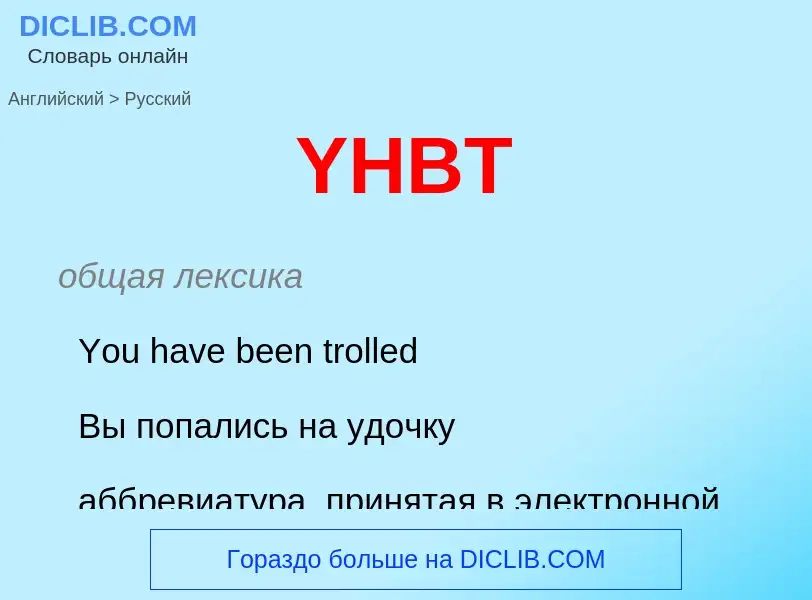Traduzione e analisi delle parole tramite l'intelligenza artificiale ChatGPT
In questa pagina puoi ottenere un'analisi dettagliata di una parola o frase, prodotta utilizzando la migliore tecnologia di intelligenza artificiale fino ad oggi:
- come viene usata la parola
- frequenza di utilizzo
- è usato più spesso nel discorso orale o scritto
- opzioni di traduzione delle parole
- esempi di utilizzo (varie frasi con traduzione)
- etimologia
YHBT - traduzione in russo
общая лексика
You have been trolled
Вы попались на удочку
аббревиатура, принятая в электронной почте
Смотрите также
Definizione
Wikipedia
Flaming, also known as roasting, is the act of posting insults, often including profanity or other offensive language, on the internet. This term should not be confused with the term trolling, which is the act of someone going online, or in person, and causing discord. Flaming emerged from the anonymity that Internet forums provide cover for users to act more aggressively. Anonymity can lead to disinhibition, which results in the swearing, offensive, and hostile language characteristic of flaming. Lack of social cues, less accountability of face-to-face communications, textual mediation and deindividualization are also likely factors. Deliberate flaming is carried out by individuals known as flamers, which are specifically motivated to incite flaming. These users specialize in flaming and target specific aspects of a controversial conversation.
While these behaviors may be typical or expected in certain types of forums, they can have dramatic, adverse effects in others. Flame wars can have a lasting impact on some internet communities where even once a flame war has concluded a division or even dissolution may occur.
The pleasant commentaries within a chat room or message board can be limited by a "war of words" fight or "flaming" with the intent to seek out a negative reaction from the reader. Humphreys defines flaming as "the use of hostile language online, including swearing, insults and otherwise offensive language"etc. Flaming by perpetrators within the online community is commonly received by messaging through text and rarely by face to face or video communication. By basing their conversations on text and not taking full accountability as the "flamer", they have a reduced self-awareness of others feelings, emotions and reactions based on the comments that they provide within the virtual community. The reader now has the perception that this "flamer" is difficult, rude and possibly a bully. The flamer may have limited social cues, emotional intelligence to adapt to others reactions and lack of awareness of how they are being perceived. Their personal social norms, may be considered disrespectful to the reader that has different social norms, education and experience with what is and is not appropriate within virtual communities.
The individuals that create an environment of flaming and hostility, lead the readers to disengage with the offender and may potentially leave the message board and chat room. The continual use of flaming within the online community can create a disruptive and negative experience for those involved and can lead to limited involvement and engagement within the original chat room and program.

